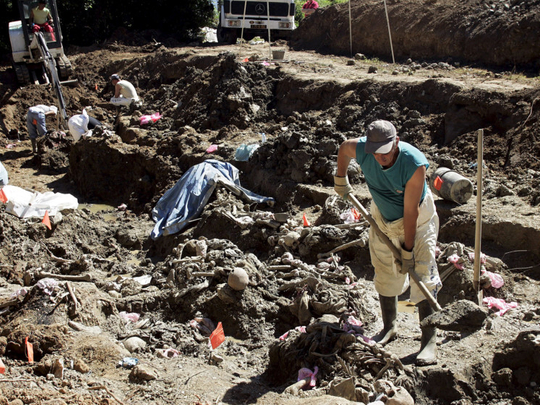
The massacre of more than 7,000 Bosniak (Bosnian Muslim) men and boys at Srebrenica was far from the only atrocity perpetrated in the war that tore apart Bosnia-Herzegovina from 1992 to 1995. However, it was and remains in a ghastly league of its own. For this reason, the 20th anniversary of the killings deserves special commemoration, buttressed by a recognition that political disorder, economic hardship, ethnic tensions and great-power rivalries in the Balkans make it high time to complete post-war reconciliation in Bosnia.
Srebrenica was the most murderous single event in Europe since the aftermath of the second world war. The international war crimes tribunal for former Yugoslavia and the International Court of Justice have each determined that the killings, carried out by Bosnian Serb forces, amounted to genocide. But the massacre also stands out for the shameful failure to prevent it that, even today, is a scar on the conscience of the United Nations and of western governments that were drawn into the war.
Working tirelessly for two decades, investigators, prosecutors and judges at the war crimes tribunal based at The Hague have amassed more than 1,000 testimonies of the events and have used them to secure convictions. Srebrenica was a Bosniak enclave in eastern Bosnia that was under UN protection, but the Bosnian Serbs over-ran it in July 1995. Out of 20 people indicted for crimes committed at Srebrenica, final judgements have been issued against 15 individuals, only one of whom has been found not guilty.
Twenty years on, the sad, unpleasant truth is that political representatives of ordinary Bosniaks, Bosnian Serbs and Bosnian Croats still do not approach Srebrenica and other harrowing wartime episodes in the spirit of reconciliation and a common future. Rather, they manipulate the bitterness and pain of the past in order to cement support in their communities and entrench their personal power and privileges. It is not mindsets trapped in the violent 1990s, but the political exploitation of these mindsets, that keeps Bosnia Europe’s most dysfunctional state. This is a condition accentuated by the US-brokered Dayton settlement of November 1995, which established power-sharing arrangements among Bosnia’s three nationalities so complex that political paralysis was the price of peace.
In principle, Bosnia has a “European future”, a perspective that received a boost in March when European Union (EU) governments approved an association agreement, putting Bosnia on the road to eventual membership of the 28-nation bloc. In practice, this is a distant prospect because, quite simply, the Bosnian state does not work. In its latest report on Bosnia, the European Commission says there has been “no tangible progress” in establishing functioning institutions.
The problems include Bosnia’s stumbling efforts to build a market economy, disastrously high unemployment and an inability to tackle corruption and organised crime, including human and drug trafficking. Scarcely less dispiriting is a media climate that is sharply polarised along political and ethnic lines. As in Kosovo, the EU and the United States bear some blame, because their supervision of the Bosnian state has tolerated its descent into a Balkan black hole on the grounds that at least there has been no danger of another full-scale war.
Recent trends make this approach no longer tenable. A faultline of instability runs from Greece, flirting with debt default and Eurozone exit; to Macedonia, where political and ethnic violence erupted in May; to Kosovo, a state scarcely less precarious now than when it won independence under western auspices in 2008; and northwards to Serbia and Bosnia-Herzegovina. Each country’s troubles bleed into those of its neighbours: ethnic Albanian tensions in Macedonia stir a response in Kosovo, which in turn infects political debate in Serbia, which in turn feeds into disputes over war crimes suspects in Bosnia.
Most Balkan countries have weak or inefficient states that find it difficult to master challenges such as irregular migration flows that originate from outside Europe. This is a problem for the EU, not just the Balkans. By extending the bloc’s external borders to Bosnia, Croatia’s EU entry in 2013 has ensured that state weakness in Bosnia feeds illegal migration into the EU. More than 60,000 migrants have this year crossed into the EU via Serbia’s border with Hungary, an even higher number than have arrived on Italy’s shores.
For western governments, an additional headache is that Russia is seeking to strengthen its military, diplomatic and economic presence in the Balkans. The Srebrenica anniversary provides an opportunity for the West to restate its commitment to reconciliation, freedom, prosperity and stability in the region.
— Financial Times










